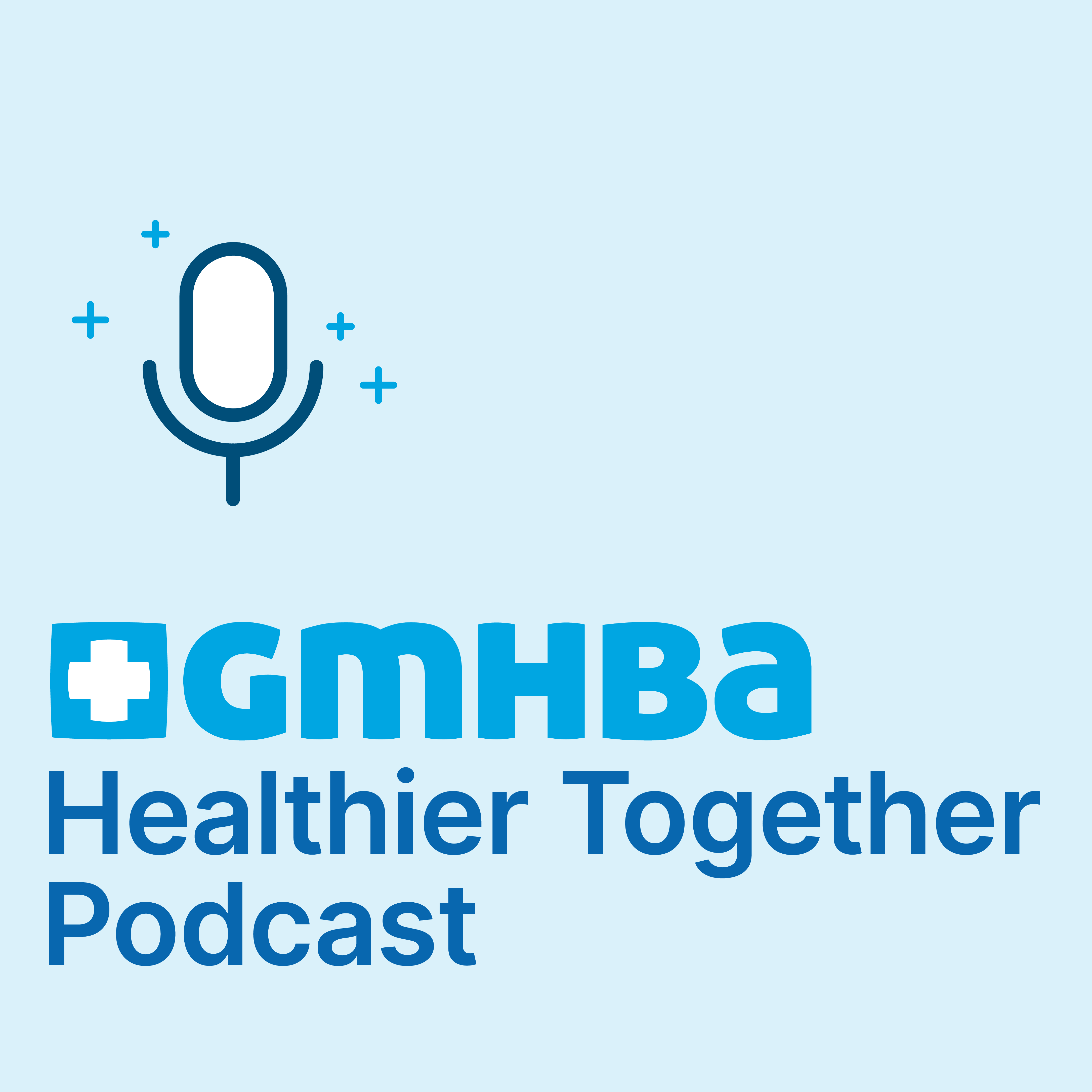Episodes
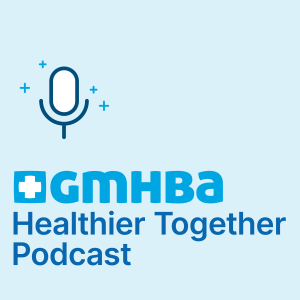
Friday Nov 07, 2025
Eating for longevity and vibrant aging
Friday Nov 07, 2025
Friday Nov 07, 2025
The choices we make around food can have a powerful impact on how we age, from our energy levels to our brain health, bone strength, and the overall quality of our life. How can we make sure we’re making the right choices? Nutritionist Mel Bald offers a wide range of advice to make sure our diet supports us for years to come.

Monday Aug 11, 2025
The emotional connection to eating
Monday Aug 11, 2025
Monday Aug 11, 2025
How often do we take the time to be mindful of our emotions when eating? Whether it's reaching for chocolate after a tough day, craving toast when we're lonely, or even skipping meals when we're stressed — our emotions can play a huge role in how and why we eat. Nutritional expert Mel Bald chats with Healthier Together about our emotional connection to food.
(1.45) What is emotional eating?
(3.05) How to tell the difference between physical hunger and emotional eating.
(4.33) Awareness between emotions and eating.
(5.58) Are we born emotional eaters or is it learnt behaviour?
(7.20) Most common emotional triggers.
(10.49) Why does food become emotionally charged?
(11.50) Why we reach for unhealthy or treat foods.
(14.27) What to do to change emotional eating habits.
(19.16) The role of self-compassion in emotional eating.
Useful resources
How our behaviour can motivate us to eat for health
Healthy food choices to combat diabetes
At the time of publication, GMHBA have provided current, evidence-based information, however information
contained in these podcasts should not be relied on as a substitute for professional medical advice. Views expressed
in this podcast are not necessarily the view of GMHBA and we make no representation regarding the quality,
accuracy or completeness of the information. GMHBA is not liable for any loss or damage suffered arising out of the
reliance on the information, text, photos or advertisements used in this podcast, except that which cannot be
excluded by law. All materials appearing in GMHBA’s Healthier Together podcast is copyright.
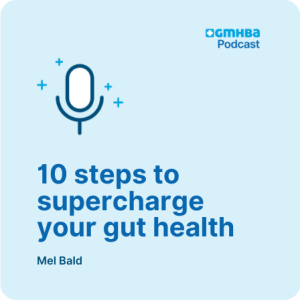
Thursday May 08, 2025
10 steps to supercharge your gut health
Thursday May 08, 2025
Thursday May 08, 2025
We often think with our stomach, go with our gut intuition and they say we are what we eat, but did you realise just how much of an impact what you eat and do has on your gut? Nutritionist Mel Bald chats with Healthier Together about 10 steps to supercharge your gut health.
(0.51) What is gut health?
(2.15) How do we know if our gut is healthy?
(4.08) Step 1: Eat a diverse range of plant foods
(6.30) Step 2: Bump up the fibre
(8.33) Step 3: Include fermented foods
(11.16) Step 4: Limit the foods gut bacteria doesn’t like
(13.21) Step 5: Stay hydrated
(16.00) Step 6: Manage stress
(18.45) Step 7: Avoid the overuse of antibiotics
(19.21) Step 8: Add pre-biotic foods to your diet
(20.43) Step 9: Add polyphenols
(22.03) Step 10: Exercise
Useful resources
At the time of publication, GMHBA have provided current, evidence-based information, however information contained in these podcasts should not be relied on as a substitute for professional medical advice. Views expressed in this podcast are not necessarily the view of GMHBA and we make no representation regarding the quality, accuracy or completeness of the information. GMHBA is not liable for any loss or damage suffered arising out of the reliance on the information, text, photos or advertisements used in this podcast, except that which cannot be excluded by law. All materials appearing in GMHBA’s Healthier Together podcast is copyright.
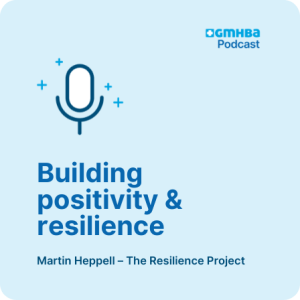
Monday Feb 10, 2025
Building positivity and resilience
Monday Feb 10, 2025
Monday Feb 10, 2025
It is estimated that almost half of Australians will experience poor mental health at some point in their lives, and the findings are even more concerning for our young people. We speak with Martin Heppell, of The Resilience Project, an organisation that is taking a proactive approach to addressing youth mental health and wellbeing with learnings for us all.
(2.25) About The Resilience Project
(4.15) The Resilience Project program
(8.18) Youth mental health statistics
(10.48) Kids and social media
(16.06 Gratitude, empathy and mindfulness
(20.50) Practising GEM in our daily lives
(24.22) What is the future of The Resilience Project?
(25.28) Key findings about the program
(28.46) The Resilience Project at home
Useful resources
At the time of publication, GMHBA have provided current, evidence-based information, however information contained in these podcasts should not be relied on as a substitute for professional medical advice. Views expressed in this podcast are not necessarily the view of GMHBA and we make no representation regarding the quality, accuracy or completeness of the information. GMHBA is not liable for any loss or damage suffered arising out of the reliance on the information, text, photos or advertisements used in this podcast, except that which cannot be excluded by law. All materials appearing in GMHBA’s Healthier Together podcast is copyright.
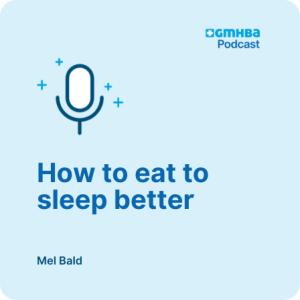
Monday Feb 10, 2025
How to eat to sleep better
Monday Feb 10, 2025
Monday Feb 10, 2025
It’s the dream for most to wake up feeling refreshed and ready for the day ahead. While for some, sleep comes easily, for many a good night’s sleep remains elusive. We speak with nutritionist Mel Bald about the science of sleep and the impact that diet can have on our ability to get some decent shut-eye.
(0.42) The importance of sleep
(1.32) How much sleep do we need?
(2.13) The science of sleep
(4.15) Diet and sleep quality
(8.42) Bedtime routine strategies for success
(10.25) Foods that can hinder sleep
(11.40) Gut health and sleep
(13.19) Setting yourself up for a good night’s sleep
Useful resources
At the time of publication, GMHBA have provided current, evidence-based information, however information contained in these podcasts should not be relied on as a substitute for professional medical advice. Views expressed in this podcast are not necessarily the view of GMHBA and we make no representation regarding the quality, accuracy or completeness of the information. GMHBA is not liable for any loss or damage suffered arising out of the reliance on the information, text, photos or advertisements used in this podcast, except that which cannot be excluded by law. All materials appearing in GMHBA’s Healthier Together podcast is copyright.
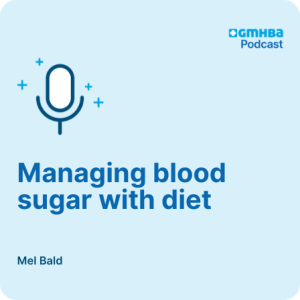
Wednesday Nov 06, 2024
Managing blood sugar with diet
Wednesday Nov 06, 2024
Wednesday Nov 06, 2024
Blood sugar isn’t just controlled by simply adding or removing teaspoons of sugar from our diet. Everything we eat can have an impact on our blood sugar levels. Nutritionist Mel Bald takes us through what blood sugar is, its causes and the simple steps we can take to support our blood sugar levels.
(0.40) What is high blood sugar?
(3.35) How do we know if we have high blood sugar?
(4.30) Risk factors for high blood sugar
(5.28) Causes of high blood sugar
(8.18) Key dietary principles for managing high blood sugar
(14.58) Specific foods to help manage blood glucose levels
(16.48) Interpreting food labels
(18.29) Foods to avoid or limit
(19.57) Advice on choosing bread
(22.04) Lifestyle changes to complement diet
(25.36) Myths and misconceptions about blood sugar
(29.32) Where to do for further information
Useful resources
Baker Heart and Diabetes Institute
At the time of publication, GMHBA have provided current, evidence-based information, however information contained in these podcasts should not be relied on as a substitute for professional medical advice. Views expressed in this podcast are not necessarily the view of GMHBA and we make no representation regarding the quality, accuracy or completeness of the information. GMHBA is not liable for any loss or damage suffered arising out of the reliance on the information, text, photos or advertisements used in this podcast, except that which cannot be excluded by law. All materials appearing in GMHBA’s Healthier Together podcast is copyright.
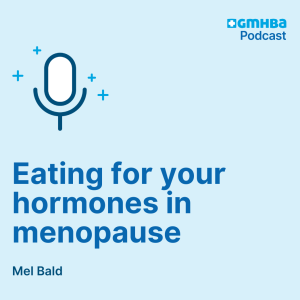
Tuesday Jul 30, 2024
Eating for your hormones in menopause
Tuesday Jul 30, 2024
Tuesday Jul 30, 2024
Menopause is a part of life for around half of the world’s population, marked by hormonal changes that cause varying symptoms and experiences. In this podcast, nutritionist Mel Bald discusses the physiological changes and the role that the food we eat can play in supporting the body through this period of transition.
This podcast refers to women and a general age range for the onset of menopausal symptoms, however we acknowledge that menopause can affect a broad range of people and not only cisgender women (those whose gender identity matches the sex they are assigned at birth). Menopausal symptoms, caused by fluctuations in oestrogen, progesterone and testosterone, can also be brought on by certain medicines, health conditions, surgeries or hormone therapies, and do not always directly correlate with the age of menopausal individuals. For more information, please speak with your doctor.
(0.42) Hormonal changes that occur during menopause and effects on overall health and wellbeing
(3.46) The role of nutrition in supporting hormonal imbalances and symptoms
(4.48) Dietary pattens to follow in menopause
(5.20) Specific foods to incorporate into the diet
(13.04) Protein and carbohydrates
(17.15) Food or dietary habits to avoid
(21.56) The impact of weight on hormonal balance
(26.31) Further information on menopause and nutrition
Useful resources
At the time of publication, GMHBA have provided current, evidence-based information, however information contained in these podcasts should not be relied on as a substitute for professional medical advice. Views expressed in this podcast are not necessarily the view of GMHBA and we make no representation regarding the quality, accuracy or completeness of the information. GMHBA is not liable for any loss or damage suffered arising out of the reliance on the information, text, photos or advertisements used in this podcast, except that which cannot be excluded by law. All materials appearing in GMHBA’s Healthier Together podcast is copyright.
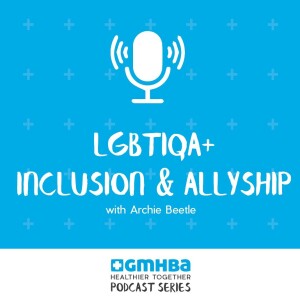
Tuesday May 07, 2024
LGBTIQA+ inclusion and allyship
Tuesday May 07, 2024
Tuesday May 07, 2024
In this podcast we speak with Queer Town founder and director Archie Beetle about the important work they do delivering LGBTIQA+ inclusion and allyship training along with practical tips for fostering inclusivity and showing your support for LGBTIQA+ friends, family and community members.
(1.39) An introduction to Queer Town LGBTIQA+ inclusion workshops
(3.49) The current climate for LGBTIQA+ people in Australia
(7.52) An evolving acronym
(11.01) Sex, gender and sexuality
(14.26) Gender pronouns
(17.36) Advice for supporting LGBTIQA+ friends and family members
(19.13) Workplace culture and fostering inclusivity
(20.38) The impetus for Queer Town
Useful resources
LGBTIQA+ 101: A quick guide by Queer Town
At the time of publication, GMHBA have provided current, evidence-based information, however information contained in these podcasts should not be relied on as a substitute for professional medical advice. Views expressed in this podcast are not necessarily the view of GMHBA and we make no representation regarding the quality, accuracy or completeness of the information. GMHBA is not liable for any loss or damage suffered arising out of the reliance on the information, text, photos or advertisements used in this podcast, except that which cannot be excluded by law. All materials appearing in GMHBA’s Healthier Together podcast are copyright.
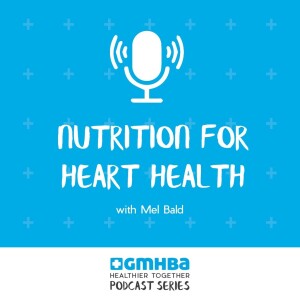
Monday Apr 22, 2024
Nutrition for heart health
Monday Apr 22, 2024
Monday Apr 22, 2024
Good nutrition is vital for our overall health and wellbeing, and crucial to ensuring our body gets what it needs to function at its best. Nutritionist Mel Bald takes us through the foods to favour – and ones to avoid – to support our cardiovascular system and help maintain a healthy heart.
(0.50) The impacts of nutrition on heart health
(2.18) What is cholesterol?
(5.09) Influencing cholesterol types and levels through diet
(8.14) Current recommendations for meat consumption
(10.10) Full-fat or reduced-fat dairy?
(11.29) What about eggs?
(12.46) Salt and heart health
(15.21) The effects of alcohol on the heart
(16.45) Foods that have a positive impact
(19.14) Tips for boosting veggie intake
(21.31) Further information
Useful resources
At the time of publication, GMHBA have provided current, evidence-based information, however information contained in these podcasts should not be relied on as a substitute for professional medical advice. Views expressed in this podcast are not necessarily the view of GMHBA and we make no representation regarding the quality, accuracy or completeness of the information. GMHBA is not liable for any loss or damage suffered arising out of the reliance on the information, text, photos or advertisements used in this podcast, except that which cannot be excluded by law. All materials appearing in GMHBA’s Healthier Together podcast is copyright.
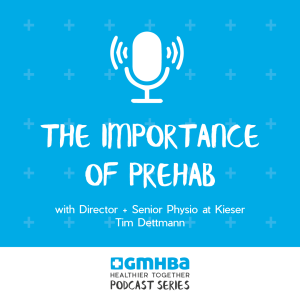
Tuesday Jan 24, 2023
The importance of prehabilitation
Tuesday Jan 24, 2023
Tuesday Jan 24, 2023
Did you know that prehabilitation can help delay surgery or improve the outcome of surgery, potentially reducing your time in hospital and increasing your mobility? Director & Senior Physio at Kieser, Tim Dettmann explains the importance of prehab and busts the myth about strength training.

